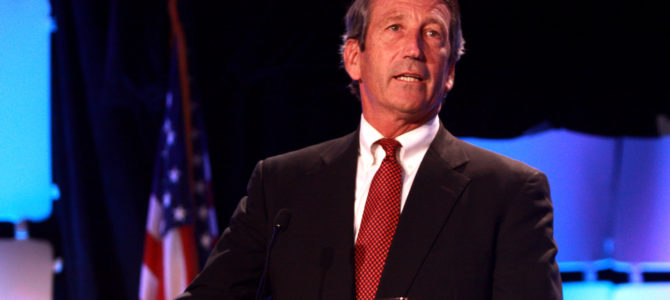Former South Carolina Republican Governor Mark Sanford ended his longshot presidential bid Tuesday after failing to pick-up significant support while several states began to cancel their nominating contests.
Sanford, 59, cited impeachment as his primary motivation for ending his campaign.
“I am suspending my race for the presidency because impeachment has made my goal of making the debt, deficit, and spending issue a part of this presidential debate impossible right now,” Sanford said in a statement announcing his leaving the campaign trail, according to CNN. “From day one, I was fully aware of how hard it would be to elevate these issues with a sitting president of my own party ignoring them. Impeachment noise has moved what was hard to herculean as nearly everything in Republican Party politics is currently viewed through the prism of impeachment.”
From the very beginning, Sanford acknowledged the uphill battle he was up against by launching a primary against a president of his own party.
In August, Sanford made the case that there was enough room to challenge the president by running on a message of fiscal responsibility.
“If I’m wrong, then the campaign will be short-lived,” Sanford told The Federalist. And short-lived it was. Sanford ended his campaign just two months after entering the contest.
“Until the impeachment process is dealt with, I don’t think you can have a serious conversation in the Republican Party on just about anything,” Sanford said to reporters in New Hampshire Tuesday as reported by CBS.
“Never before has our country been this financially vulnerable as we are today based on the roundup of debt and deficit, and the numbers that come with it,” the former governor added while holding a $1 trillion check in his hand to represent the national debt.
Last month, the Treasury Department revealed that the U.S. debt and deficit have been hitting all-time highs, with the federal deficit reaching nearly $1 trillion in the 2019 fiscal year primary due to entitlement spending. The Congressional Budget Office has forecasted the deficit to exceed that number next year as runaway spending on programs such as Social Security and Medicare see no signs of slowing down.
Meanwhile, the national debt as officially surpassed $23 trillion, and neither party seems fixated on paying it down.
Sanford made running on a platform to restore fiscal responsibility as a key value of the Republican Party the centerpiece of his brief campaign, though it failed to garner the necessary support to become a competitive threat against the president’s hold on the GOP.
Prior to announcing his candidacy, Sanford had most recently served in the U.S. House of Representatives as a vocal critic of the president before losing a primary to a Trump-endorsed challenger as the incumbent representative.
His tenure as South Carolina’s chief executive from 2003 to 2011 has been tarnished by a 2009 scandal where Sanford was caught lying about his whereabouts claiming to be hiking the Appalachian Trail when he was actually in South America with an Argentine mistress.
The scandal earned the former governor the nickname “Mr. Appalachian Trail,” from President Trump in what became one of the president’s few attacks on Sanford in this year’s campaign as Trump has given little attention to his primary challengers.
https://twitter.com/realDonaldTrump/status/1166494781935095810?s=20
Sanford, who had pledged throughout the campaign to refrain from engaging in personal attacks with the president stayed on message and highlighted the rising debt and deficits.
So ready for a President that can move beyond either self praise or put down to one who will focus on the debt & deficit that have gone wild under his time in office. Spending 27% above Obama & deficits even higher. It’s time for a change. https://t.co/oghlZQxAfL
— Mark Sanford (@MarkSanford) August 28, 2019
Sanford faced his own impeachment proceedings in the state legislature at the time but was ultimately acquitted of the charges and served the remainder of his term before returning to Congress in a closely-watched 2013 special election. Sanford had also served in the House of Representatives from 1995 to 2001.









